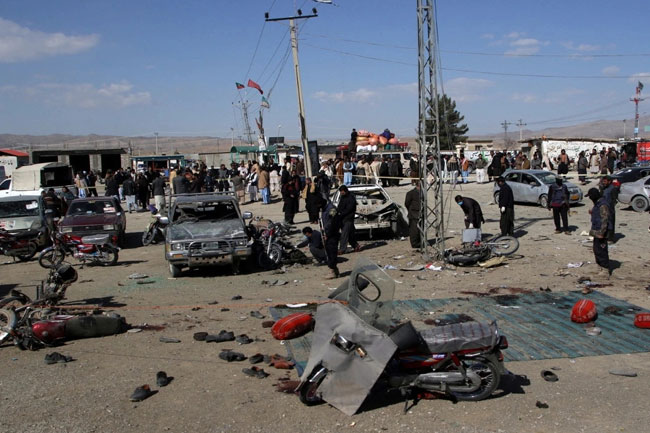Separatist militant attacks on police stations, railway lines and highways in Pakistan’s restive province of Balochistan, coupled with retaliatory operations by security forces, killed more than 60 people, officials said on Monday.
The most widespread assault by ethnic insurgents in years forms part of a decades-long effort to win secession of the resource-rich southwestern province, home to major China-led projects such as a strategic port and a gold and copper mine.
“These attacks are a well thought out plan to create anarchy in Pakistan,” Interior Minister Mohsin Naqvi said in a statement, adding that security forces had killed 12 militants in operations after the attacks on Sunday and Monday.
Pakistan’s military said 14 soldiers and police, and 21 militants, were killed in fighting after the largest of the attacks, which targeted vehicles from buses to goods trucks on a major highway.
It was not immediately clear whether that included the 12 militants the interior ministry confirmed dead.
Local officials said at least 23 passengers were killed in the attack, with 35 vehicles set ablaze.

Rail traffic with Quetta was suspended following blasts on a rail bridge linking the provincial capital to the rest of Pakistan, as well as on a rail link to neighbouring Iran, railways official Muhammad Kashif said.
Police said they had found six as yet unidentified bodies near the site of the attack on the railway bridge.
Officials said militants also targeted police and security stations in Balochistan, which is Pakistan’s largest province by area, killing at least 10 people in one attack.
Militant group the Baloch Liberation Army (BLA) took responsibility in a statement to journalists that claimed many more attacks, including one on a major paramilitary base, though Pakistani authorities have yet to confirm these.
The BLA is the biggest of several ethnic insurgent groups that have battled the central government for decades, saying it unfairly exploits Balochistan’s gas and mineral resources. It seeks the expulsion of China and independence for the province.
Prime Minister Shehbaz Sharif vowed that security forces would retaliate and bring those responsible to justice.
General Li Qiaoming, commander of China’s People’s Liberation Army Ground Forces and Pakistan’s army chief Asim Munir met on Monday, though a Pakistani military statement made no mention of the attacks.
“The meeting afforded an opportunity for in-depth discussions on matters of mutual interest, regional security, military training, and measures to further augment bilateral defence cooperation,” it said.
PASSENGERS KILLED
On Sunday night, armed men blocked a highway in Balochistan, marched passengers off vehicles, and shot them after checking their identity cards, a senior superintendent of police, Ayub Achakzai, told Reuters.
As many as 35 vehicles, including trucks, were set on fire on the highway in the area of Musakhail.
“The armed men also not only killed passengers but also killed the drivers of trucks carrying coal,” said Hameed Zahir, deputy commissioner of the area.
Militants have targeted workers from the eastern province of Punjab whom they see as exploiting their resources.
In the past, they have also attacked Chinese interests and citizens in the province, where China runs the strategic southern deepwater port of Gawadar, as well as a gold and copper mine in its west.
The BLA said its fighters targeted military personnel travelling in civilian clothes, who were shot after being identified.
Pakistan’s interior ministry said the dead were innocent citizens.
Six security personnel, three civilians and one tribal elder made up the ten killed in clashes with armed militants who stormed a station of the Balochistan Levies in the central district of Kalat, police official Dostain Khan Dashti said.
Officials said police stations had also been attacked in two southern coastal towns, but the toll had yet to be confirmed.
Balochistan, which borders both Iran and Afghanistan, is Pakistan’s largest province by size, but the least populated and remains largely underdeveloped, with high levels of poverty.

Source: Reuters


